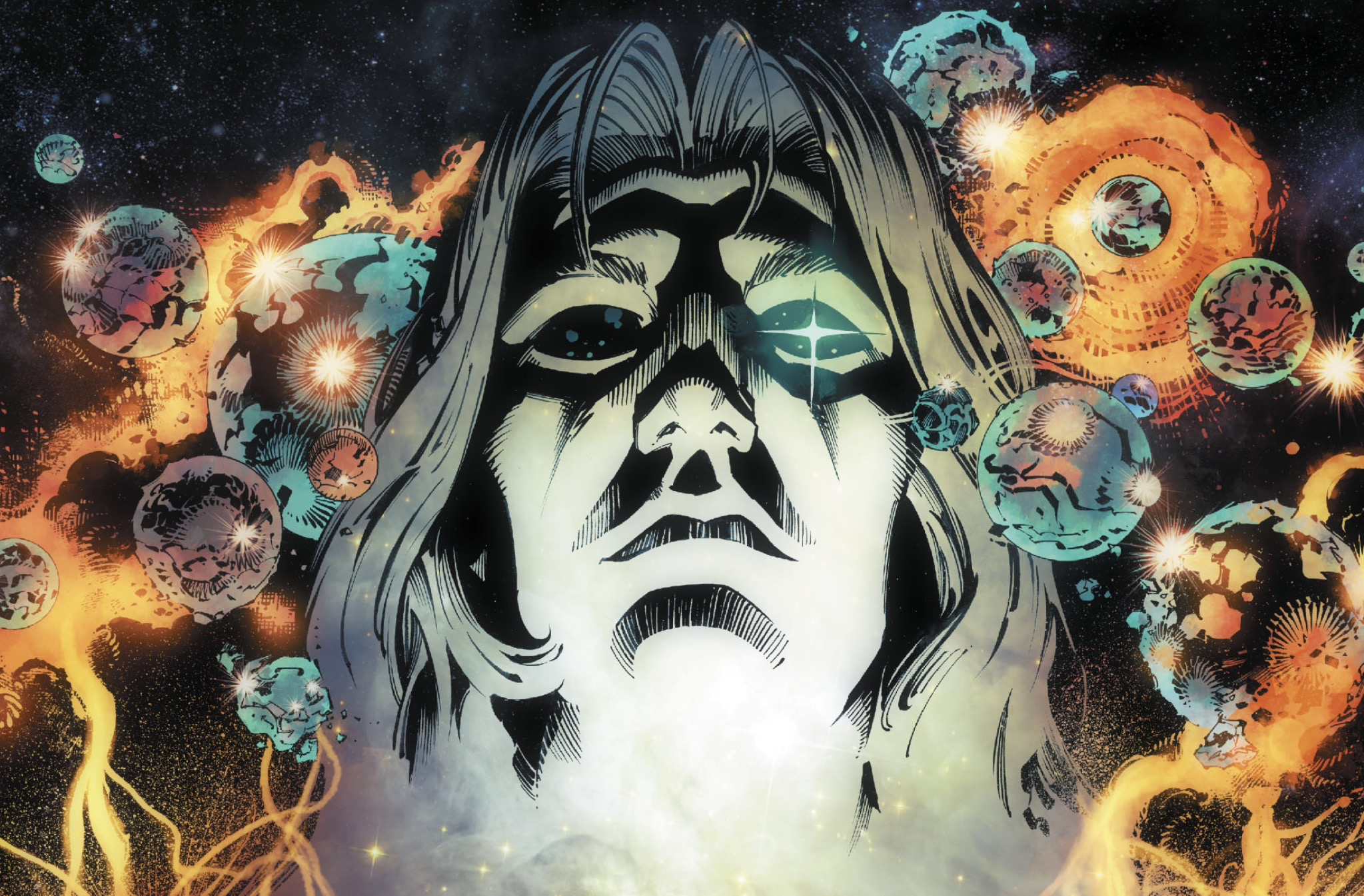
A common distinction that critics often draw between the House of Ideas and its Distinguished Competition is that the former’s heroes tend to be more flawed and full of pathos with whom readers can relate, whereas the latter are more idealized paragons for fans instead to emulate. But whereas this differentiating factor is nowhere near so sharp as during the hight of their rivalry in the Silver Age, a far more pronounced difference has been etched over the course of the Modern and Postmodern Ages of Comics. With perhaps a single notable exception, Marvel Comics are concerned primarily with telling stories solely on a textual and subtextual level. DC, on the other hand, is awash with examples of metatextual storytelling regarding the importance of stories in general, comics in particular, and the relationship between DC’s own publishing history and that of our own real world. Much of this can be attributed to the work of the British Invaders – particularly Moore’s work on Watchmen, Gaiman’s on Sandman, and Morrison’s on Final Crisis – and the tendency of latter writers to pick up on threads set down in such influential stories. The latter two in particular are picked up in the pages of DC’s latest tentpole event by scribe Scott Snyder, whose more Marvel-esque work on Batman gives way to a more Morrison-esque metatextuality in Metal #4.
Hal Jordan has a wonderful line in this issue, in which he says to Mr. Terrific, “It feels like Im part of a story which I’m not supposed to understand.” This is no offhanded quip. All of the heroes here have some modicum of understanding that they are in characters in a story someone else is reading, with Batman and Superman seeing this to be literally so in the Library of Lucien. Indeed, it is there that they are told by the Prince of Stories, the very personification of storytelling itself, what may very well end up as being Snyder’s thesis behind Metal: “I can give you the most powerful weapon in all of creation. I can give you a story.”
But beyond merely reinforcing the characters qua characters and their self-perception as such, Green Lantern’s line also likewise works on the level of Snyder speaking directly to the reader. This is not a story which the readers is supposed to understand. The expectations which he establishes earlier in the event as to how the plot will proceed are specifically subverted by the issue’s end. Time and again he puts our heroes through the gauntlet, bringing them low in the processes, and in good storytelling fashion offers at the moment of dyscatastrophe an opportunity for heroism, wherein they remember some animating virtue such as hope and as a result rally once more, but instead of being vindicated, Snyder instead sinks them further and further to unfathomed depths of despair. The issue starts exactly where Batman: Lost left off, wherein Batman’s resolve for the first time in his eight decade publishing history was truly and utterly broken, lost to the dark and screaming in abject horror. This seemed the lowest he could go, and therefore the perfect moment for a climatic turn, a reversal of fortunes finally favoring the side of good. Instead, the World’s Finest’s last ditch gambit to the fiery Forge of Worlds fails before they even arrive, with the Sandman stating “And with those words, this book, and all hope, burns to ash.”
The prominence of Sandman in this issue evidences Gaiman’s influence on Snyder for this story, but even more so is Morrison’s Final Crisis. Billed as “The Day that Evil Won,” Metal might as well be “The Day that Evil Won Again.” In Final Crisis, the antagonist is the platonic Form of Evil itself; in Metal, the adversary is the word-weapon which proceeded from that primordial evil. In Crisis, Superman lifts a book with infinite pages containing every possible story; in Metal, Superman and Batman visit a library full of impossible stories that would never – could never – be told. In Crisis, the blank gutter space of non-story begins to eat away at the narrative within the panels; in Metal, the books burn and whole worlds with them. None of which is to suggest that Snyder is merely aping Morrison. Rather, it’s an acknowledgment that he’s acutely aware as to worked so well and how to homage such in his spiritual sequel.
In reply to Green Lantern’s metatextual statement, Mr. Terrific opines “[I]f I’ve learned anything it’s that every cosmic answer leads to another question. Instead of feeling bigger, real science makes us feel smaller. And that’s a good thing.” The genius of Metal #4 is that Snyder knows there’s a thin divide between cosmic wonder and cosmic horror, between awe and awful, between dream and nightmare, between textual and metatextual. And then he burns down that divide to ashes.
8.75/10


